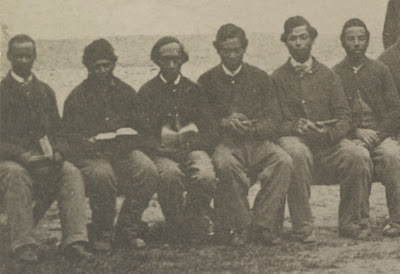When enslaved African American left their enslavers and joined the Union army they not only found the opportunity to labor and fight for their freedom, they also sometimes found opportunities to received an education.
During the antebellum years the majority of slave states made it illegal for the enslaved to learn to read and write. Being long denied an education only made some new black soldiers all that more thirsty for knowledge. In many recruiting, enlistment, and training camps organizations, both civil and religious in nature, such as freedmen's aid societies and the American Missionary Association sent teachers to work with soldiers and their refugee families.
This cropped image, possibly taken on the South Carolina coast, shows a group of 6 of the 18 African American soldiers sitting with uniforms on and books in hand. It must have opened up a whole new world to those that had previously only learned through hearing and observing. Two men, the one of the far left and the second from the right appear to be wearing a cravats.
In this view two white men, who appear to be officers and two white women, who are likely teachers, appear behind the middle group of six soldiers. Like those to the left, most have books in their hands. The majority of the soldiers wear four-button fatigue blouses, while the man second from the right has a nine button frock coat and the man on the far right has his blouse open showing a multi-button vest. Hair styles vary from close cropped to long.
The final grouping, too, shows the men with reading material. A white man, who appears to be a civilian, stands behind the soldier on the far left. One soldier, the second from the right, appears to be mixed race as he has a lighter complexion and seems to have straighter hair than his comrades.
Abolitionist John G. Fee, an employee of the American Missionary Association and who had ministered in Kentucky before the Civil War but had been exiled from the Bluegrass State after John Brown's raid, wrote the following after observing the soldiers at Camp Nelson and their thirst for knowledge:
"Here
are thousands of noble men, made in the image of God, just emerging from the
restraints of slavery in the liberties and responsibilities of free men, and of
soldiers. I find them manifesting an
almost universal desire to learn; and [in] that they do make rapid
progress . . . . When we consider that this people have great physical strength, are
manifestly capable of rapid intellectual development, that they are humble,
grateful, trusting, religiously inclined – that they are destined to occupy an
important place in the army and agriculture of this nation, I feel that it is
blessed to labor with such a people. The
Lord help"
Image courtesy of the Library of Congress.











No comments:
Post a Comment